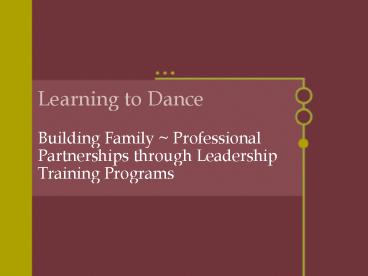Learning to Dance - PowerPoint PPT Presentation
1 / 28
Title:
Learning to Dance
Description:
Learning to Dance. Building Family ~ Professional Partnerships through Leadership ... Where the dance begins... Partnership Planning. Communication. Commitment ... – PowerPoint PPT presentation
Number of Views:95
Avg rating:3.0/5.0
Title: Learning to Dance
1
Learning to Dance
- Building Family Professional Partnerships
through Leadership Training Programs
2
(No Transcript)
3
- At our best level of existence,
- we are parts of a family,
- and at our highest level of achievement,
- we work to keep the family alive.
- Maya Angelou
4
- Experiences of family professional partnerships
5
Maternal Child Health Mission
- To build a society where healthy children and
healthy families live in healthy communities - Core values leadership, diversity, equity,
integrity, social justice, partnership
empowerment, and honesty
6
MCH Training Programs
- Our vision for the 21st century is that all
children, youth, and families will live and
thrive in healthy communities served by a quality
workforce that helps assure their health and well
being. - MCHB MCH Training Program funds public and
private non-profit institutions of higher
learning to provide leadership training in MCH to
achieve this vision - http//mchb.hrsa.gov/training/index.asp
7
Funded Projects by Program
- Adolescent Health
- Certificate in MCH Public Health
- Collaborative Office Rounds
- Communication Disorders
- Continuing Education
- Developmental - Behavioral
- Pediatrics Distance Learning
- LEND
- MCH Institute
- MCH Pipeline
- Nursing
- Nutrition
- Pediatric Dentistry
- Pediatric Pulmonary Centers
- Research Training Enhancement
- Schools of Public Health Social Work
8
Title V Family Involvement
- Family professional partnerships
- MCHB strategic plan block grant
- OBRA
- Healthy People 2010 goals
- NC Division of Public Health responsible for
measuring FPP progress - The Family Council
- Family Liasion Specialist
9
The Family Council for CYSHCN
- 21 members are diverse across race/ethnicity,
geography, income, service use, family
composition - Representative of the definition of children and
youth with special health care needs - Established a new strategic plan in 2006
10
The Family Council Ultimate Goal
- Children youth with special healthcare needs
are healthy active citizens and leaders
11
The UNC Consortium
- Initiated in 2000
- Comprised of 5 MCHB - funded leadership training
programs at UNC - MCH/School of Public Health
- LEND/CDL
- MCH Nutrition
- Pediatric Dentistry
- Social Work
12
National Performance Measures
- The Performance Measures as they relate to
leadership training programs - NPM 7 (Family Participation)
- NPM 11 (Cultural Competence)
- NPM 59 (Collaboration with Title V)
13
The Leadership Trainees
- Selected through competitive application process
- Students in training for clinical, program
development, or policy positions in MCH - Varied experiences working with CYSHCN their
families - Leadership development program included 5
workshops
14
Where the dance begins
15
Partnership Planning
- Communication
- Commitment
- Equality
- Skills
- Trust
- Respect
16
Workshop Planning
- Developed planning committee of FC members,
trainees, faculty - Workshop concept evolved throughout the planning
period - FC member participants in workshops
- Readings, assignments, stories
17
Workshop Learning Objectives
- To increase trainees awareness of disability/
CYSHCN as an integral component of MCH practice
and policy - To increase trainees appreciation of the
importance of family professional collaboration - To provide trainees with methods of
incorporating family perspectives into MCH
leadership
18
The Workshops
- Framework for collaboration
- Creating a learning community
- Ground rules hearing, respecting, responding
- Strengths focused
- Power of stories
19
Partner Feedback
- Formal efforts to gather feedback from
- Council members
- Consortium members
- Trainees
- Two phases of feedback
- Following each workshop
- Feedback shaped future directions
20
Trainee Comments
- Appreciated family participation
- shed a different light to our conversations
brought a dose of reality to the table - remind us about our insensitivities the
reason we are all doing this - Concerns about application
- Policy and program development
- International work research
- Populations other than CYSHCN
21
Family Council Feedback
- Overall, positive experience
- Enjoyed open discussion energy of trainees
- Developed an appreciation for the importance of
training professionals in policy program
development - Not only direct care providers
- Increased personal leadership skills
22
Reflections
- Clinical, policy, individual cultures and
experiences shape perceptions - The presence of the rich culture of families
results in participants confronting the issues
more directly - Family involvement on a continuum from direct
care interaction to family professional
collaboration at the systems level - Leadership development requires continuous
reflection
23
Reflections
- Consortium in full agreement that the partnership
is valuable on multiple levels - Strengthened relationships between Title V and
the training programs - Broadened faculty understanding of CYSHCN systems
of care and experiences of families
24
Family Council Future Planning
- FC members unanimously agree to continue
partnership with UNC - through other leadership training workshops
- on other projects
- As a result of experiences this year, FC members
are - more interested in advocacy
- more aware of continuing education possibilities
25
Consortium Future Planning
- Explore the potential for family members to
participate as a discipline in the leadership
development program - Integrating family participation into grant
proposals - Systematically identifying trainees to bridge
Title V and academia
26
Future Planning
- Allow the workshops to count for formal credits
for family members - Develop a collaborative product
- Advocacy project
- Legislative research
- Policy development
- Increase leadership capacity across the Family
Council - Leverage resources to build MCH capacity
27
(No Transcript)
28
Presenters
- Joy Hales
- jhales_at_triad.rr.com
- Marlyn Wells
- Marlyn.wells_at_ncmail.net
- Marcia Roth
- Marcia_roth_at_unc.edu
- Julia Wacker
- jlwacker_at_gmail.com































